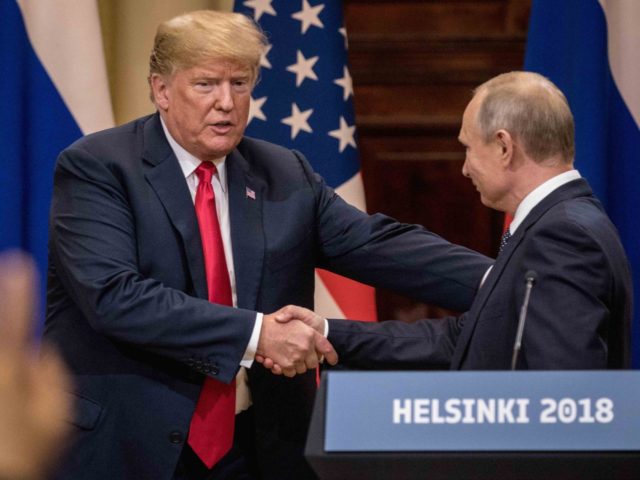The idea that President Donald Trump is a racist refuses to die, even though the main arguments have long since been disproven, and there is a mountain of evidence to the contrary.
It is like the “Russia collusion” hoax, which Democrats and the media continue to pursue even though, after two-and-a-half years, there is no evidence at all linking the Trump campaign with the Russian government, and Trump is tougher on Russia than his predecessors.
Both hoaxes work the same way. They are believed in by the president’s opponents and critics, because both seem to provide a way of removing him from office. Once entertained, even tentatively, confirmation bias does the rest.
Both hoaxes grab attention with extraordinary, shocking claims — a president who supports neo-Nazis! a president who is secretly a foreign agent! — that explain the otherwise inexplicable fact (to some) that Trump was elected.
Crucially, they also start with Trump receiving unsolicited support from the bad guys.
When Trump soared to the front of the Republican field, against the opposition of the media and the political establishment, a small but vocal fringe sought to use his momentum to their advantage. Former David Duke Grand Wizard backed Trump, as did an army of racist and antisemitic Twitter trolls. The media played up their significance to damage Trump.
Trump had already disavowed Duke in August 2015, but the media kept asking him about it, partly to establish a connection where there was none. When, in one CNN interview, Trump hesitated before repeating his disavowal (though he had done so the day before and would do so the day after), the media turned that into proof he empathized with the far-right. As a result, no one remembers the other denunciations, or care that Duke now backs a Democrat.
Similarly with Russia. In late 2015, in the thick of the Republican primary, Russian president Vladimir Putin was asked about Trump, and said he was “talented” and “absolutely the leader in the American presidential race.” That kicked off a frenzy of media speculation.
When, in July 2016, Trump joked about asking Russia to find Hillary Clinton’s deleted emails, the FBI and CIA started an investigation. Even they had been taken in by the fake news.
Trump has done anything and everything possible to denounce bigotry, and to help the people who are targeted by it. In his very first address to Congress, just a few weeks after taking office, he began by noting “our celebration of Black History Month” and condemning the “[r]ecent threats targeting Jewish community centers and vandalism of Jewish cemeteries.”
In his first 100 days, Trump launched air strikes against Syria — over conservative opposition — to protect innocent Muslims from chemical weapons attacks. He appointed a gay ambassador to Germany, one of the highest openly gay U.S. officials ever. He opened an embassy in Jerusalem, the capital of the Jewish state. And he repeatedly cites his success in promoting black and Hispanic employment, as well as women’s employment.
On Russia, Trump is strong: “attacking Russia’s Syrian proxy for using chemical weapons; sending military aid to Ukraine; urging European firms to pull out of a natural gas pipeline project with Russia; declaring that the U.S. will withdraw from the Intermediate-Range Nuclear Forces Treaty over Russian violations; pulling out of the nuclear deal with Iran, over Russian objections; and imposing various sanctions on Russia,” Breitbart News has noted.
Yet the very fact that Trump is diplomatic with Putin is the only “proof” the media needs to continue its obsession.
Arguably, Trump often makes things worse for himself by hesitating when he is asked about racism or about Russia. The reason he does so is apparent, at least to those outside the media bubble: the questions are usually a trap. To answer them is to risk accepting the false premise that there is a connection Trump must disavow.
As Dilbert cartoonist Scott Adams noted Saturday, when Trump was asked on Friday whether white nationalism was rising, it ought to have been easy for him to convey concern.
But Trump sensed the journalist’s real aim was to establish that white nationalism was rising because of Trump. Had Trump answered that he did, in fact, see white nationalism on the rise, the media would have suggested he had accepted responsibility for it.
Perhaps Trump knows all the denunciations in the world will not matter. On Sunday, Fox News Sunday host Chris Wallace repeatedly asked acting White House Chief of Staff Nick Mulvaney whether the president would consider giving a speech denouncing white supremacy. CNN congressional correspondent Manu Raju tweeted Wallace’s claim as if it were true.
The irony: Trump already gave a speech denouncing white supremacy. He delivered it on August 14, 2017 — the day before the press conference on Charlottesville where he used the phrase “very fine people” to refer to protesters who were not neo-Nazis. The media — particularly CNN — continue to claim Trump was praising neo-Nazis when he was doing the opposite.
Our mainstream media have brainwashed half the public — and themselves — to believe the worst. Ironically, they may be encouraging the racists by misleading them into believing Trump supports them, and helping the Russians by confounding our political system.
The only antidote is dissenting media — which they are desperate to destroy.
Joel B. Pollak is Senior Editor-at-Large at Breitbart News. He is a winner of the 2018 Robert Novak Journalism Alumni Fellowship. He is also the co-author of How Trump Won: The Inside Story of a Revolution, which is available from Regnery. Follow him on Twitter at @joelpollak.

COMMENTS
Please let us know if you're having issues with commenting.